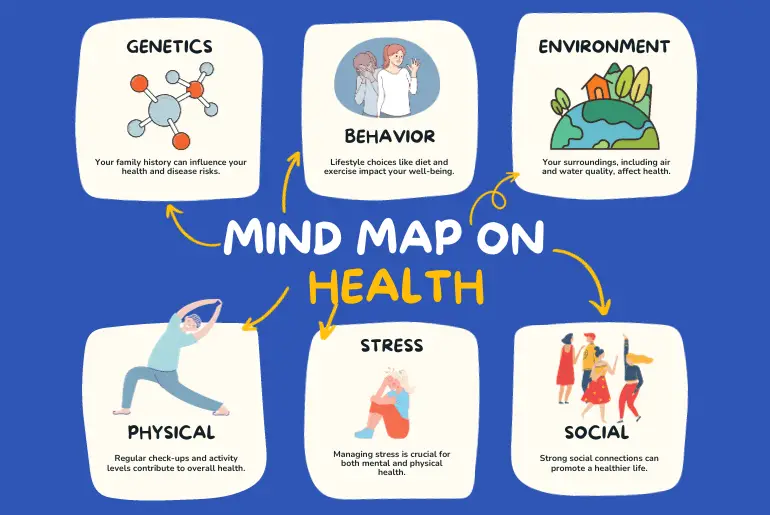Nutrition directly influences mental health by nourishing the brain and protecting it from oxidative stress. A diet rich in vitamins, minerals, and antioxidants can enhance cognitive function and prevent issues like anxiety and depression.
Understanding the vital connection between nutrition and mental wellness is crucial for overall well-being. Studies have demonstrated that consuming whole, unprocessed foods can alleviate symptoms of depression and anxiety. Conversely, an unhealthy diet high in sugar and processed foods can lead to inflammation in the body and brain, contributing to mood disorders.
By making mindful choices in our diet, we can positively impact our mental health and emotional well-being. This article delves into the intricate relationship between nutrition and mental health, highlighting the importance of maintaining a balanced diet for optimal cognitive function and emotional stability.
The Link Between Nutrition And Mental Health
Nutrition plays a crucial role in influencing mental health. The connection between the two is intricate, with brain function being significantly affected by one’s diet. The impact of nutrition on thinking and cognitive abilities is substantial. A balanced diet rich in vitamins, minerals, and antioxidants is known to nourish the brain, protecting it from oxidative stress. Conversely, sugar and processed foods can lead to inflammation throughout the body and the brain, contributing to mood disorders such as anxiety and depression. Understanding the effects of nutrition on mental health plays a vital role in promoting emotional well-being and preventing mental illness.

Credit: nutrition.org
Types Of Nutrients That Impact Mental Health
Nutrition plays a crucial role in impacting mental health, with certain types of nutrients having a significant effect. A healthy diet rich in vitamins, minerals, and antioxidants can nourish the brain and protect it from oxidative stress, while avoiding processed foods and sugar can help prevent inflammation that may contribute to mood disorders such as anxiety and depression.
| Vitamins and minerals: A deficiency in certain vitamins and minerals can impact mood and cognitive functions. |
| Healthy fats: Omega-3 fatty acids found in fish and nuts are essential for brain health and emotional well-being. |
| Fiber and whole grains: These help regulate blood sugar levels and promote a healthy gut, which is linked to improved mental health. |
Impact Of Unhealthy Diets On Mental Health
Unhealthy diets can significantly impact mental health, leading to mood disorders and cognitive issues. Consuming processed foods and high sugar content can trigger inflammation in the brain, contributing to anxiety and depression. A diet rich in vitamins, minerals, and antioxidants can help nourish the brain and protect it from oxidative stress, promoting overall mental well-being.
| Unhealthy Diets and Mental Health |
| Eating sugary and processed foods can trigger inflammation in the body and brain. |
| This inflammation may contribute to mood disorders such as anxiety and depression. |
| Moreover, an unhealthy diet can lead to impaired cognitive function. |
A diet high in processed foods and sugar can cause inflammation, affecting mood and cognitive abilities. Inflammation triggered by unhealthy foods may worsen anxiety and depression symptoms. Additionally, poor dietary choices can impair cognitive function, leading to difficulties in memory, learning, and thinking. Opting for a diet rich in vitamins, minerals, and whole foods can help protect the brain and improve mental well-being.

Credit: www.sciencedirect.com
The Role Of A Healthy Diet In Promoting Mental Well-being
Eating a diet rich in vitamins and minerals is crucial for mental well-being. These nutrients play a vital role in brain function and mood regulation. Besides, healthy fats such as omega-3 fatty acids support cognitive function and reduce the risk of depression. Furthermore, high-fiber foods promote gut health, which is linked to improved mental health. They also help in stabilizing blood sugar levels, thus preventing mood swings and enhancing overall well-being.
Food Choices And Mental Health
Proper nutrition plays a crucial role in maintaining good mental health. Consuming whole, unprocessed foods is essential for supporting mental well-being. Research suggests that a clean diet can have a positive impact on conditions like depression and anxiety. Including a sufficient amount of protein in your diet is also important for supporting mental health. Protein helps in the production of neurotransmitters, such as serotonin, which are responsible for regulating mood and feelings of well-being.
Eating high-quality foods that are rich in vitamins, minerals, and antioxidants nourishes the brain and protects it from oxidative stress. On the other hand, a diet high in processed foods and sugar can lead to inflammation throughout the body and brain, contributing to mood disorders such as anxiety and depression.
Studies have shown that adopting a clean diet consisting of whole, unprocessed foods can help alleviate symptoms of depression and anxiety. Emphasizing fruits, vegetables, whole grains, nuts, and seeds in your diet provides essential vitamins, minerals, healthy fats, and fiber that support mental well-being.

Credit: kids.frontiersin.org
Frequently Asked Questions Of How Nutrition Affects Mental Health
How Can Nutrition Affect Your Mental Health?
Nutrition directly impacts mental health by nourishing the brain, protecting it from oxidative stress, and affecting cognitive functions. Eating high-quality foods rich in vitamins and antioxidants can help prevent mood disorders and anxiety through reducing inflammation in the body and brain.
How Does Nutritional Factors Contribute To Mental Illness?
Nutritional factors affect mental illness by impacting brain health and cognitive functions. Consuming high-quality foods with vitamins and minerals nourishes and protects the brain from oxidative stress. Unhealthy diets can trigger stress hormones in the brain, leading to mental health issues like anxiety and depression.
How Does Healthy Lifestyle Affect Mental Health?
A healthy lifestyle affects mental health by improving emotional well-being and preventing mental illness through better sleep, diet, and exercise. Nutrient-rich foods nourish the brain, protecting it from oxidative stress and inflammation, which can contribute to mood disorders like anxiety and depression.
How Does Nutrition Affect Thinking?
Nutrition affects thinking through the gut-brain axis. An unhealthy diet can impair cognitive functions like learning and memory by activating stress hormones in the brain. Eating a healthy diet rich in vitamins, minerals, and antioxidants protects the brain and promotes optimal brain functioning.
Conclusion
The relationship between nutrition and mental health is clear. A balanced diet impacts cognitive functions and protects the brain from oxidative stress. It also plays a significant role in preventing mood disorders and anxiety. By making healthy dietary choices, individuals can improve their emotional well-being and enhance their mental health.











